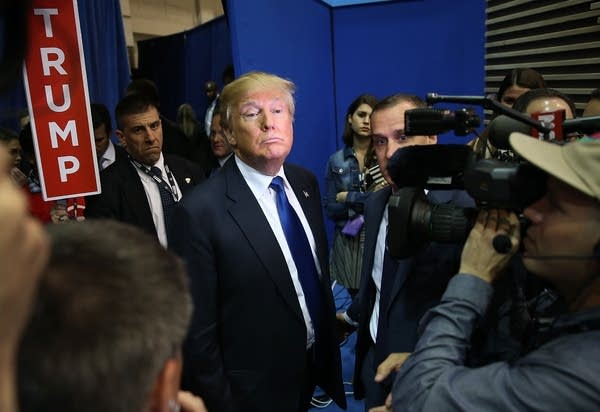Caucus system, no ground game cost Trump in Minnesota

Go Deeper.
Create an account or log in to save stories.
Like this?
Thanks for liking this story! We have added it to a list of your favorite stories.
Minnesota stood out on Super Tuesday as the only win for Republican presidential candidate Marco Rubio — and the only third-place finish for businessman Donald Trump.
While Trump padded his delegate lead in other states, his 21 percent of the vote in Minnesota will translate into only eight of the state's 38 GOP national convention delegates. Marco Rubio won 17. The remaining 13 will go to Texas Sen. Ted Cruz.
His showing in Minnesota may end up nothing more than a historical bump on the path to his nomination as the Republican presidential candidate. Still, Minnesota may provide Trump's opponents some clues on how to beat him.
For one, Trump had virtually no campaign presence in Minnesota, other than a single staffer dispatched only recently and some supporters speaking up on their own. His famed 757 airplane didn't land here.
Turn Up Your Support
MPR News helps you turn down the noise and build shared understanding. Turn up your support for this public resource and keep trusted journalism accessible to all.
Full coverage Caucus results, in-depth campaign coverage and more from MPR News
Caucuses also often draw out party diehards. Trump has excelled in primaries, where people don't have to devote as much time and effort to vote, and sometimes don't have to have an affiliation with a party to participate.
With the exception of Nevada, Trump has struggled in caucus states. Besides his third-place Minnesota finish, he got second in the two other caucus states so far, Iowa and Alaska. Three more caucuses are set for Saturday in Kansas, Kentucky and Maine.
"Donald Trump clearly did not have a ground game and didn't come in and advertise or do any of his rallies," Minnesota Republican Party Chairman Keith Downey said. "We have two candidates who that did a lot of that, and they were the ones that came out ahead."
That lack of retail politics made a difference on caucus night, he said.
While some people who attended caucuses came out to support Trump, others showed up just for the chance to vote against him.
Karen Kruse went to her caucus adamant her vote would not go to Trump.

"He does not give you straight answers as to what he's going to do," said Kruse, who declined to say who she picked. "He says he'll do it but he doesn't tell you exactly what he has planned."
Other candidates, she added, have laid out tax and immigration plans, but "Trump just says 'I want this to happen' but does not give you any details. And I think he's pretty racist."
Tony Wimmer chose Cruz, but he suspected Trump would be the big winner nationally. He said he's not getting the right vibes from the front-runner. "I don't trust Trump as much, so that's basically it."
Mike Pietrs of Shoreview voted for Rubio. He said he can't see himself voting for Trump as the Republican nominee and has gone on Facebook to discourage people from backing him.
"I wouldn't vote for him. I probably wouldn't participate in the election. That's just where I'm at," Pietrs said. "I have some pretty strong feelings about certain issues. So yeah if he got it, he'd lose me. I don't know who else he would lose. It would be a pretty sad day, a very sad day for our country, I think."
Trump certainly had backers in Minnesota.
Dentist Robert Substad said he liked Trump's reputation as a negotiator as well as the fact that he's paying for his own campaign.
"I'm a firm believer in Trump. I think we need a big change," Substad said. "I think we got to get rid of the establishment and get started over. I know Trump has a lot of faults but I think he'll do the best job."


